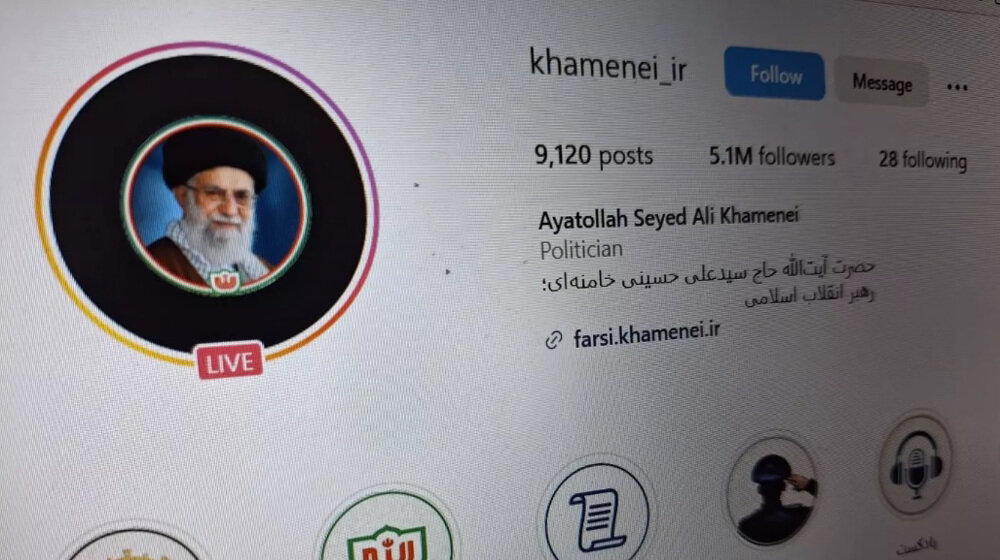Iran FM says suspension of Leader social media accounts ‘illegal and unethical’

TEHRAN- Iranian Foreign Minister Hossein Amir Abdollahian has slammed the decision by Meta to suspend the Instagram accounts of the Leader of Islamic Revolution Ayatollah Seyyed Ali Khamenei.
In an interview with the Middle East Eye news website on Friday, Amir Abdollahian reacted to Meta Company’s move to close the Leader’s Instagram and Facebook accounts.
He stated, “The mottos of freedom of expression by some Western claimants are hollow and showy slogans and a cover for their illegitimate political goals.”
Iran’s top diplomat also stressed that “blocking the media accounts of the Leader of the Revolution is not only a violation of freedom of speech, but also an insult to millions of followers of his positions and news.”
Abdollahian also accused the “Silicon Valley Empire” of trying to censor a prominent supporter of the Palestinian cause.
Amir Abdollahian condemned the anti-freedom of speech action by the Meta company in blocking the media accounts of the Leader of the Revolution and said, “His Eminence Ayatollah Khamenei is the most prominent supporter of the oppressed people of Palestine and Gaza in the world, and the Silicon Valley Empire cannot prevent this voice from reaching the public opinion of the world.”
He added that one of the signs of the collapse of morality and the moral system of the world is the unreasonable behavior of American platforms in censoring the words of Ayatollah Khamenei and the supporters of the displaced people of Gaza and more than 30,000 Palestinian martyrs in the last 5 months, and this company must answer for its illegal and unethical behavior.
He branded the suspension “illegal and unethical” and said it was indicative of the “collapse of morality and the moral system of the world.”
Meta stirred controversy by abruptly removing Instagram and Facebook accounts belonging to Ayatollah Khamenei who had a substantial following of 5.1 million users. The decision, made without prior notice, underscores the company's pro-Israeli stance.
In 2023, the Instagram account KHAMENEI.IR ranked among the top 10 accounts of world leaders. Remarkably, posts on his Farsi-language account garnered over one hundred million views in the past three months. This account, active for twelve years, boasts a staggering nine thousand posts that received eighteen million comments.
Formerly known as Facebook, Meta now owns a quartet of platforms: Instagram, WhatsApp, Facebook, and Facebook Messenger. Headquartered in Menlo Park, California, Meta provided a scant explanation for its actions, citing violations of its Dangerous Organizations and Individuals policy as justification for the account removals.
This move coincided with Ayatollah Khamenei's support for oppressed Palestinians and condemnation of the genocidal warfare in the Gaza Strip, a stance he has steadfastly maintained since October 7th. Meta's actions raise fundamental questions about the role of social media platforms in regulating political discourse and the expression of support for contentious causes.
The incident highlights the delicate balance between freedom of speech and the enforcement of platform policies, particularly concerning influential figures like Ayatollah Khamenei. While Meta's subsidiary platforms profess to foster an environment of free expression and diversity of opinion, their practices often align closely with U.S. laws and policies, potentially stifling dissenting voices that challenge mainstream narratives.
The removal of Ayatollah Khamenei's accounts signals two significant realities.
Firstly, it casts doubt on Western claims of upholding freedom of expression, revealing a willingness to silence expressive and influential voices without hesitation.
Secondly, it exposes a broader pattern of support for the Israeli regime, which has faced widespread condemnation for its violent actions against Palestinians. Meta's actions are just one facet of a larger trend of political and media support for Israel, highlighting the West's willingness to sacrifice principles for geopolitical alliances.
As such, it prompts a broader discussion about the power dynamics inherent in digital platforms and their impact on global conversations surrounding geopolitics and social justice.
“We have removed these accounts for repeatedly violating our Dangerous Organizations & Individuals policy," a Meta spokesperson purportedly told Middle East Eye following the accounts’ removal.
Mark Zuckerberg, the CEO of Facebook, has long displayed a pro-Israeli stance, a position that has come under increased scrutiny, especially in light of the recent Israeli aggression and onslaught in Gaza. Even before Meta's recent actions, Zuckerberg's intolerance towards viewpoints contrary to his own was evident.
